


The article emphasizes the essential features of a data capturer for clinical trials, underscoring the significance of advanced electronic data capture (EDC) systems, user-friendly tools, and adherence to regulatory standards. By detailing how these features enhance efficiency, accuracy, and security in data collection, the article highlights their critical role in expediting clinical trials and improving patient outcomes. This focus on EDC systems not only addresses key challenges within the Medtech landscape but also illustrates the importance of collaboration in achieving successful clinical research outcomes.
In the high-stakes world of clinical trials, the efficiency and accuracy of data capture can indeed make or break a study. As the research landscape rapidly evolves, understanding the essential features of data capture tools becomes paramount for organizations striving to maintain a competitive edge.
What specific functionalities should researchers prioritize to ensure compliance, enhance usability, and ultimately improve patient outcomes? This article delves into the ten critical features that every data capturer must possess to navigate the complexities of clinical trials successfully.
bioaccess® excels as a data capturer in providing specialized information collection services that significantly accelerate clinical trials. By employing advanced electronic information capture (EDC) systems, bioaccess® acts as a data capturer, ensuring accurate and efficient information collection, enabling faster decision-making and enhancing operational workflows. This capability is essential in the dynamic environments of Medtech, Biopharma, and Radiopharma, where prompt access to information can expedite regulatory approvals and improve market entry strategies.
The incorporation of EDC systems not only simplifies information management but also reduces human error through built-in validation checks, allowing the data capturer to ensure dependable information collection. EDC systems minimize the risk of information loss by securely storing details, which is crucial for the data capturer's role in preserving integrity in medical studies. As the research market is projected to surpass $70 billion by 2025, implementing sophisticated information collection solutions is becoming vital for sustaining competitiveness and enhancing patient outcomes.
Furthermore, the current trend towards remote and virtual trials underscores the importance of EDC systems in adapting to evolving research environments, where the data capturer facilitates efficient data collection while adhering to necessary safety protocols. Despite these advantages, challenges such as resistance to change among research professionals persist, highlighting the need for user-friendly designs and extensive training.
With a dedication to innovation and quality, bioaccess® is poised to assist Medtech innovators in navigating the intricacies of research, ultimately accelerating the advancement of medical technologies to market.
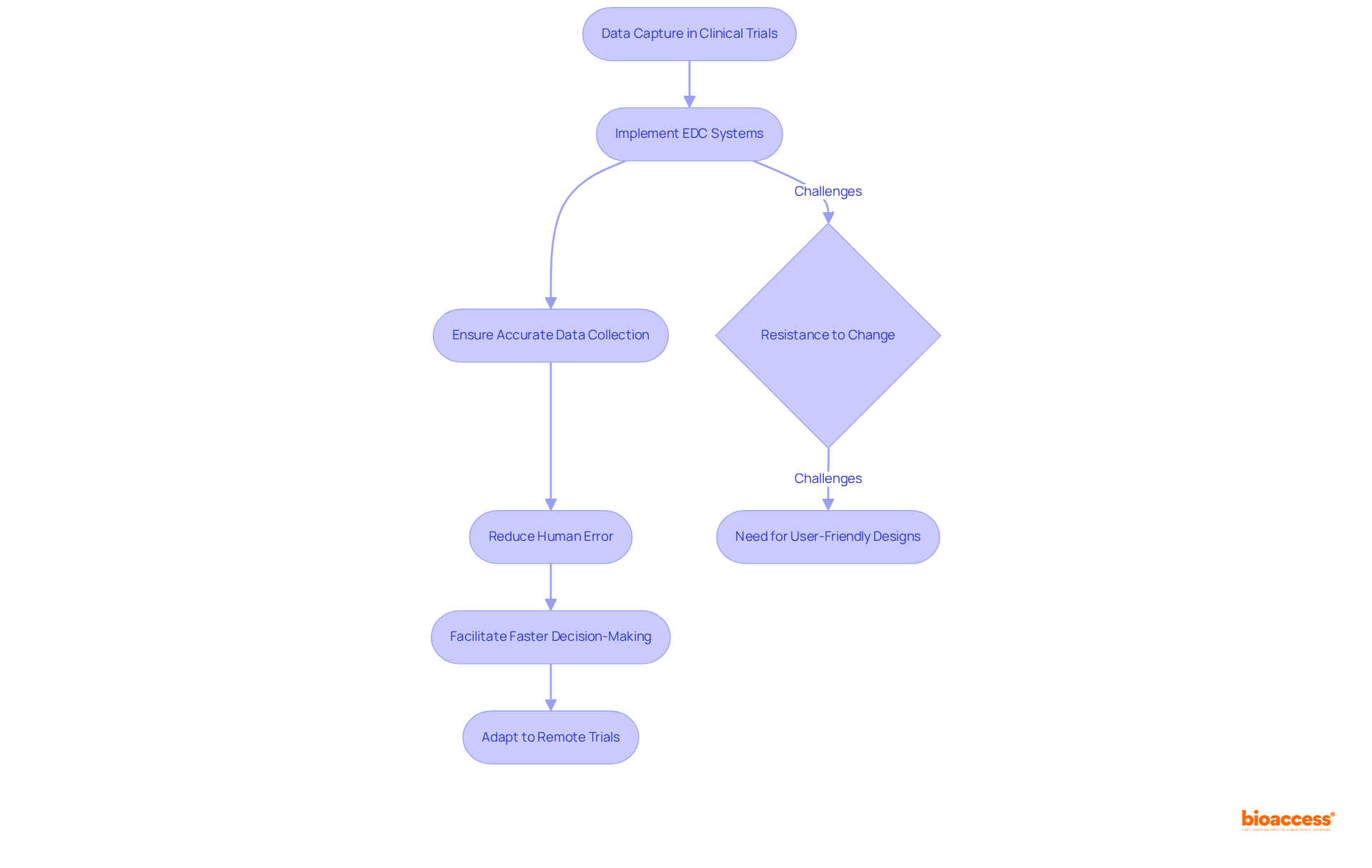
Choosing information collection tools that integrate smoothly with current healthcare processes is vital for enhancing operational efficiency. Instruments that link seamlessly with electronic health records (EHR) and other healthcare systems not only lessen the learning curve for personnel but also decrease entry mistakes. This integration enables a seamless exchange of information between systems, greatly improving the quality and dependability of the information gathered during research studies. With over 4,300 healthcare organizations relying on such integrations, including bioaccess® with more than 15 years of expertise in the field, the impact on study results is significant.
Current trends indicate that as healthcare becomes increasingly technology-driven, the demand for tools that streamline EHR integration will continue to rise. Best practices for selecting these tools include:
Significant instances of successful EHR integration in research studies, such as the ChatEHR initiative at Stanford Medicine, illustrate how these tools can enhance data precision and patient involvement, ultimately resulting in quicker enrollment and ethical approvals.
As the landscape of medical research evolves, leveraging the latest tools for EHR integration will be crucial for maintaining a competitive edge.
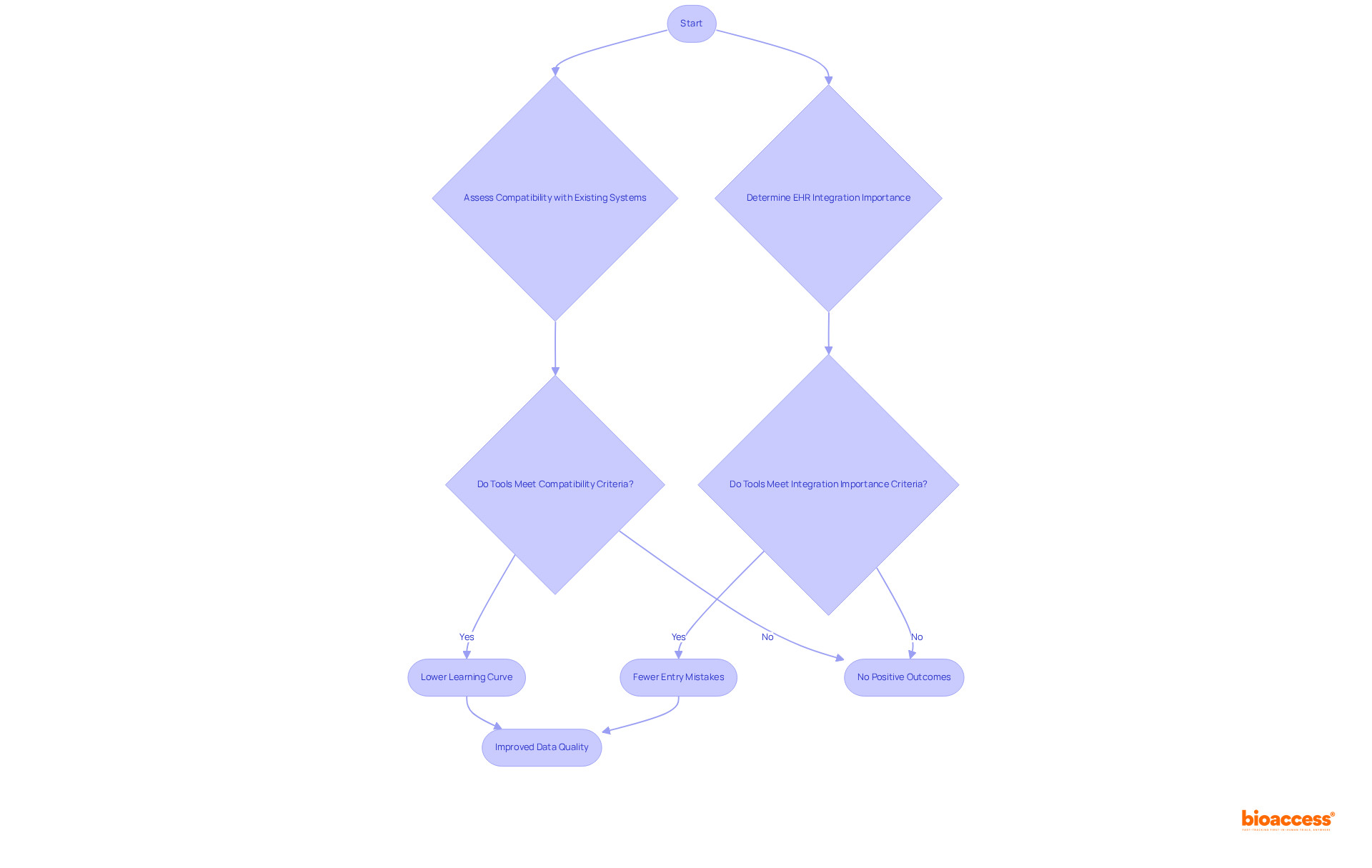
Ensuring compliance with regulatory standards, such as FDA and ICH guidelines, is crucial in the realm of clinical trials. Information capture systems must incorporate essential features that enhance compliance, including:
These audit trails serve as a comprehensive record of all user activities and information alterations, which is vital for preserving integrity and ensuring accountability. Ongoing support frameworks guarantee that EDC systems remain effective and flexible as research needs evolve. Furthermore, the integration of eSource and EDC platforms enables organizations to leverage complementary functions within studies, further enhancing compliance. By adhering to these standards, organizations not only safeguard patient safety but also bolster their credibility in the eyes of regulatory bodies, ultimately facilitating smoother approval processes. As the landscape of medical research evolves in 2025, the emphasis on regulatory adherence in information management remains paramount, underscoring the necessity for systems that can adapt to stringent requirements while ensuring high-quality information generation.
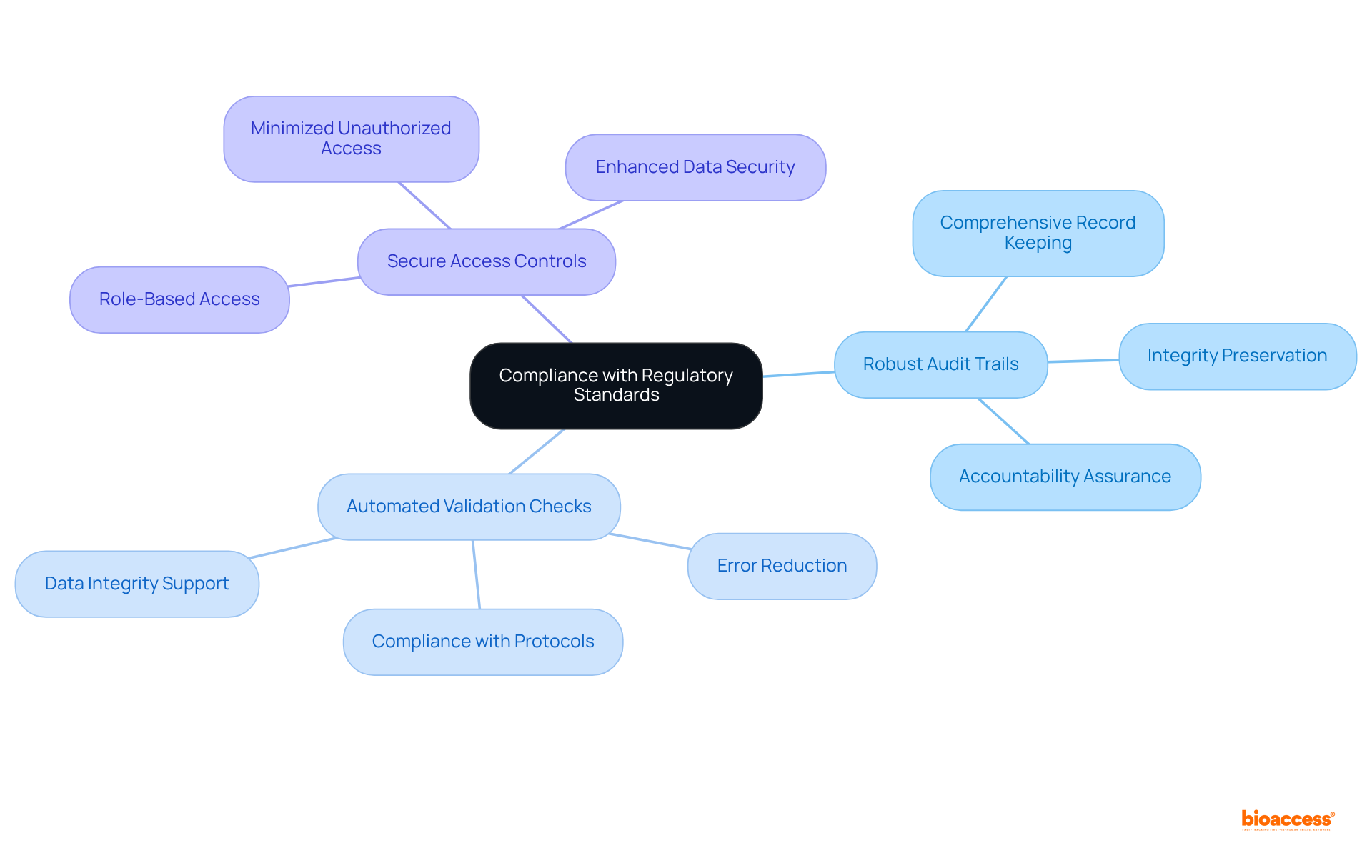
Choosing user-friendly information collection tools is essential for enhancing efficiency in research trials. Intuitive interfaces enable clinical staff to enter information quickly and precisely, significantly reducing training time and minimizing error risks. Research indicates that platforms with clear instructions and simple navigation can improve information-gathering processes, resulting in more dependable outcomes. User satisfaction data suggest that tools designed with the end-user in mind can enhance compliance and engagement, ultimately facilitating quicker enrollment and more efficient operational processes. Notably, a Phase III influenza vaccine study revealed that 85% of parents preferred using their own devices for eDiary entries, underscoring the effectiveness of user-friendly tools.
Furthermore, with over 80% of conventional studies failing to achieve enrollment goals, the significance of effective information collection tools becomes increasingly clear. As the sector transitions towards more advanced electronic information collection (EDC) systems, the focus on usability will be crucial in enhancing clinical study efficiency. Moreover, bioaccess® ensures that enrollment is 50% faster than traditional markets, highlighting the impact of intuitive interfaces on trial success.
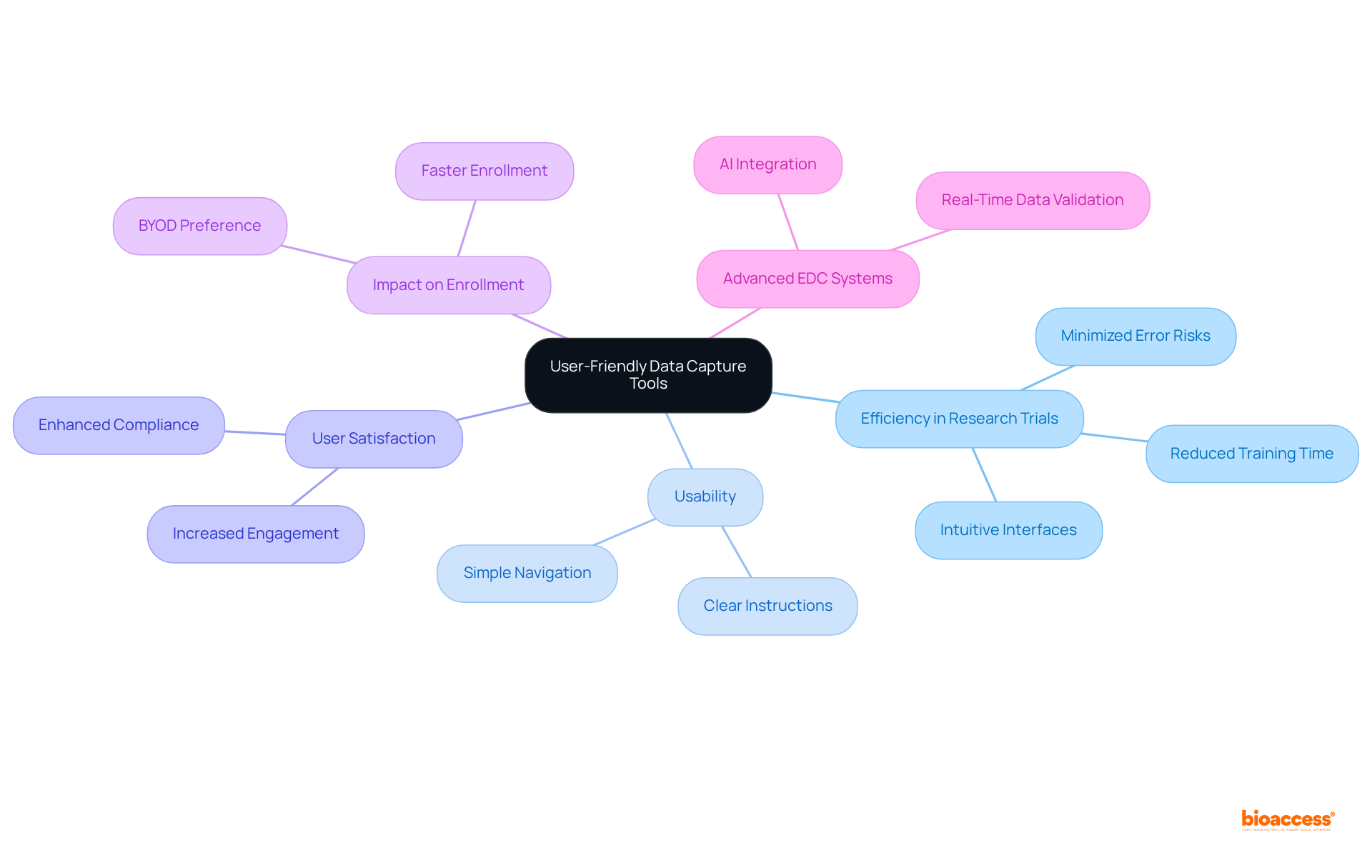
Prioritizing information security in information gathering solutions is essential to protect sensitive patient details. Efficient information collection systems must incorporate:
to safeguard against breaches. By implementing these security measures, organizations can ensure compliance with protection regulations while maintaining the trust of participants and stakeholders.
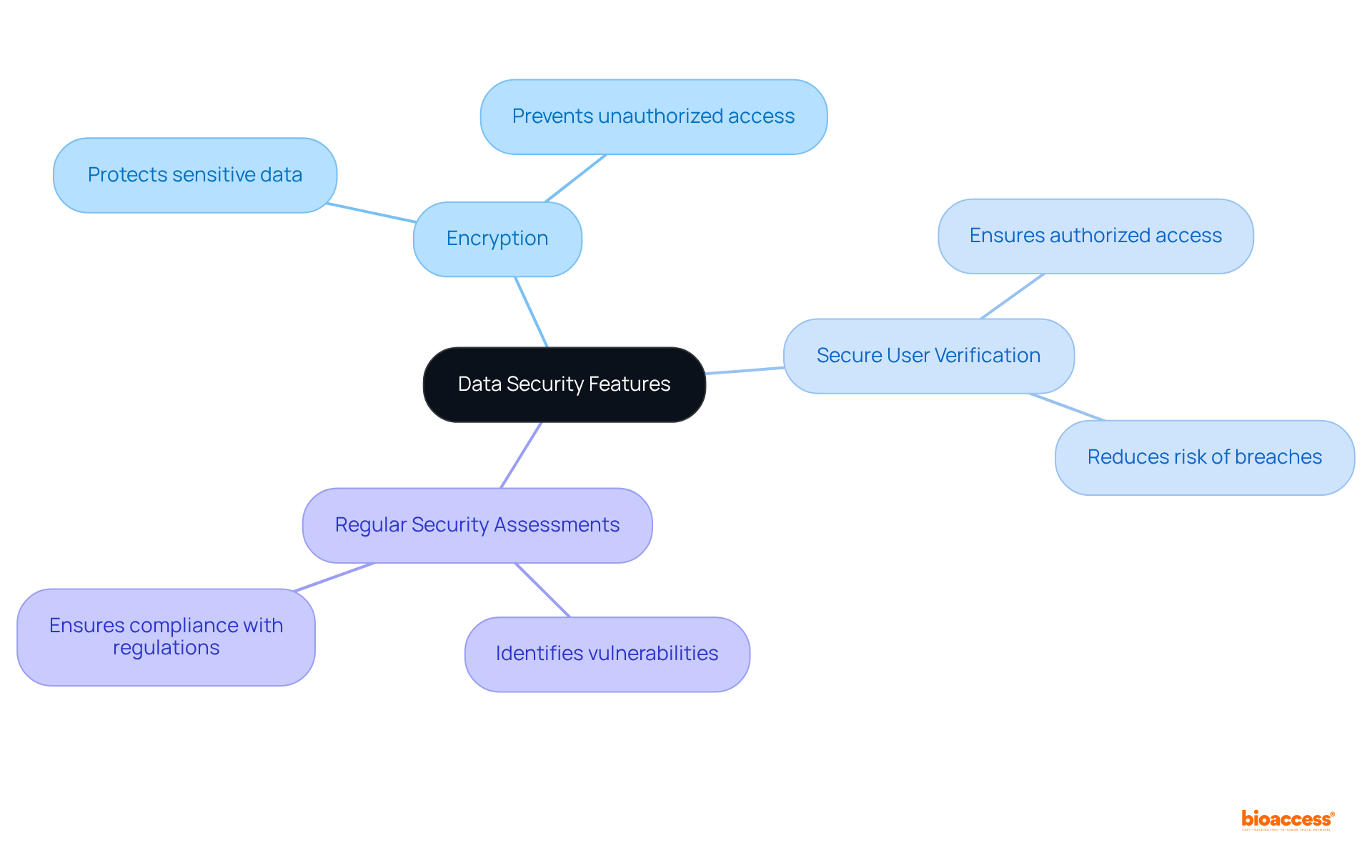
Choosing adjustable information collection solutions empowers organizations to customize their data capturer to meet the distinct requirements of each clinical study. Personalization may involve:
This level of adaptability ensures that the information collection process aligns closely with the study's objectives, thereby enhancing both relevance and quality. Research utilizing customized information collection tools has yielded improved outcomes, with some organizations reporting a 30% reduction in management costs. As highlighted by a research specialist, "The capacity to develop tailored electronic case report forms (eCRFs) is essential for guaranteeing that required data is gathered in line with research hypotheses."
Furthermore, Zelta's involvement in over 500 Phase III studies underscores the effectiveness of these customizable solutions in real-world applications. Additionally, Zelta supports more than 70 languages and dialects, showcasing the versatility of these tools across diverse research environments. To fully leverage the benefits of customizable information capture solutions, organizations should assess their specific testing needs and consider implementing tailored tools like a data capturer that enhance information integrity and efficiency.
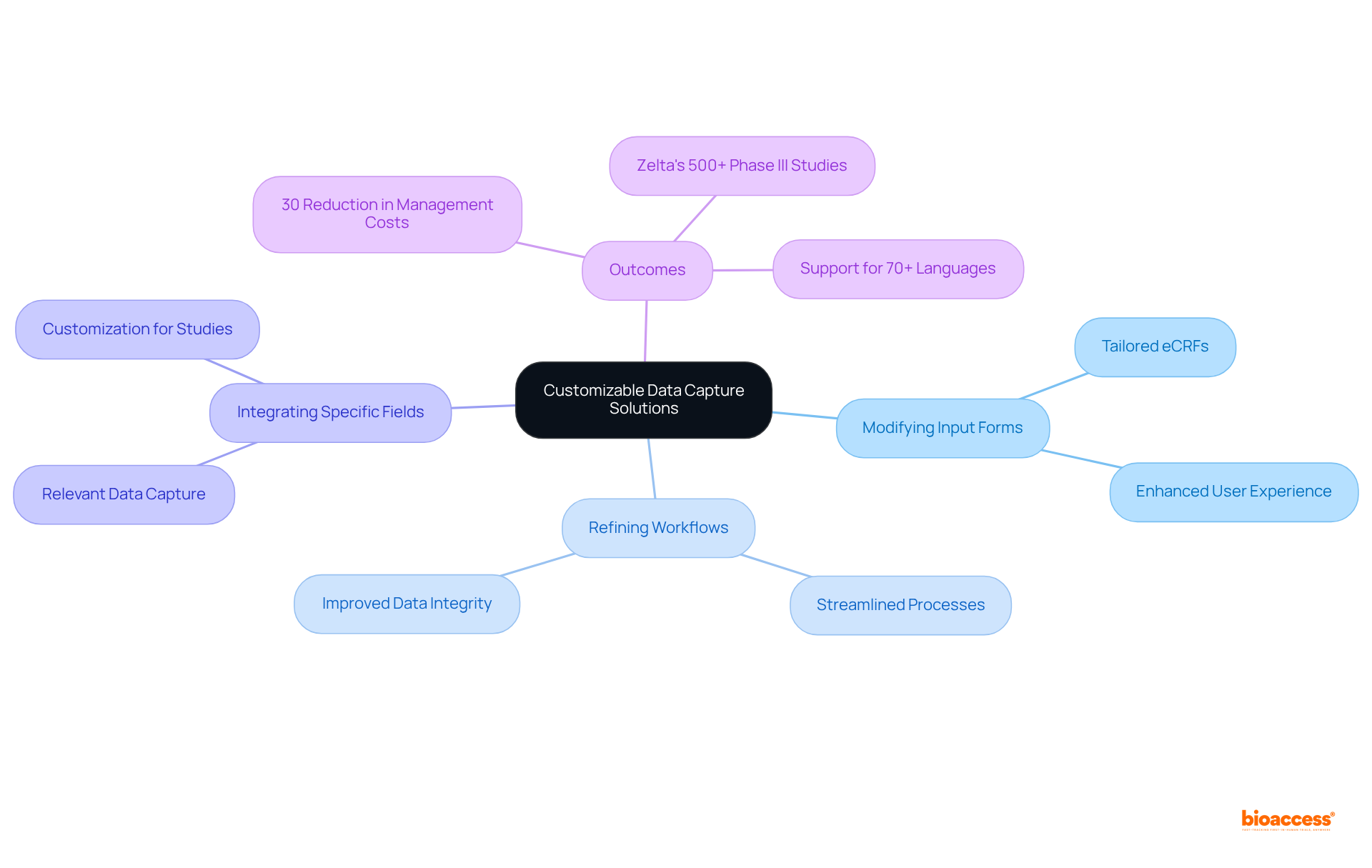
Employing real-time information analysis empowers clinical research teams to make swift, informed decisions. Access to current information allows researchers to identify trends, monitor patient responses, and adjust protocols as necessary. This capability significantly enhances study efficiency and bolsters patient safety, as timely interventions can be executed based on the latest insights.
Research indicates that real-time information access can reduce patient risk evaluation durations from over five minutes to just two minutes, facilitating faster identification of high-risk patients. Moreover, the integration of systems like Twinkle has shown improved operational efficiencies, enabling clinicians to seamlessly track individual patient performance and appointment statuses.
Such advancements not only streamline processes but also elevate patient outcomes, underscoring the substantial impact of timely information on healthcare decision-making.
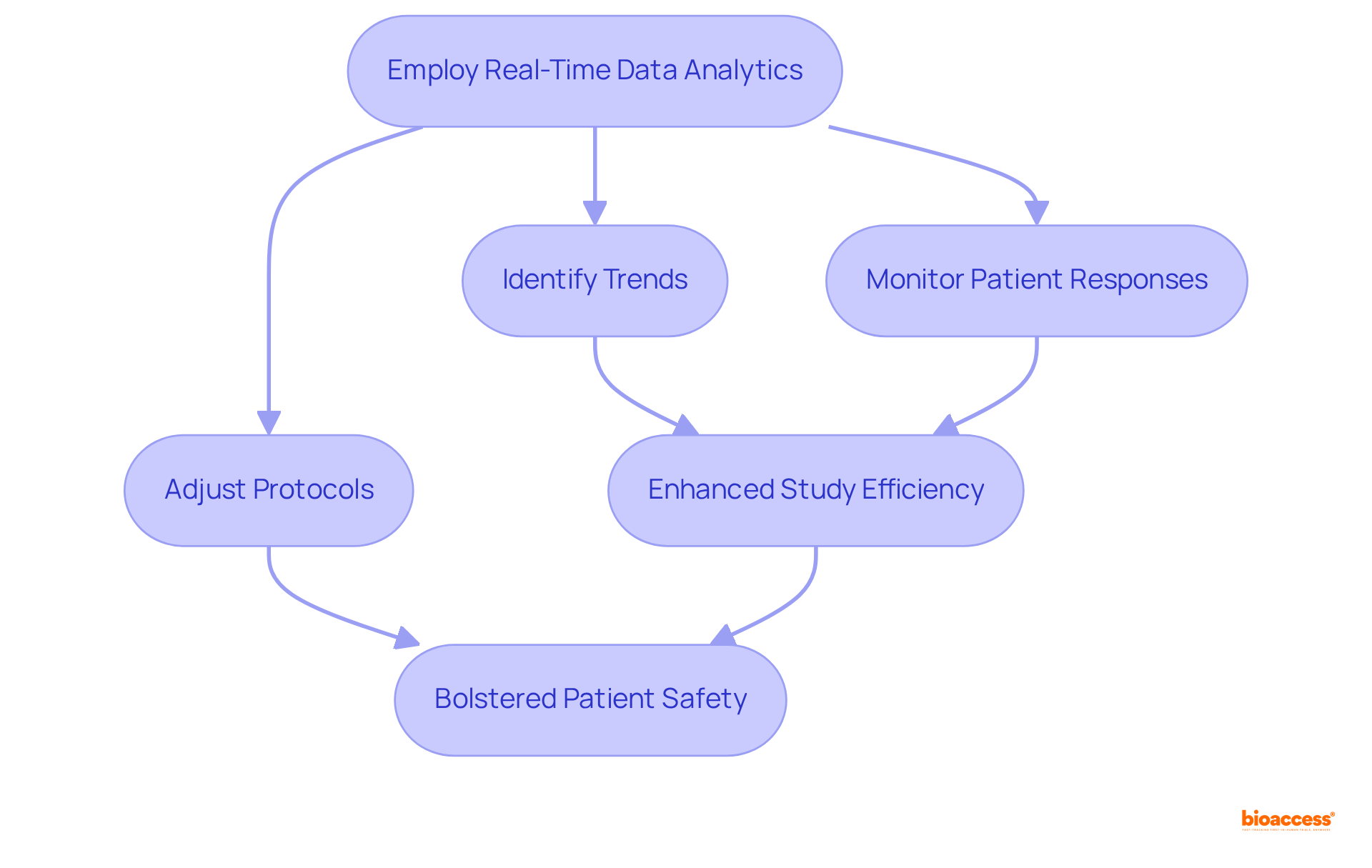
Vendor assistance and thorough instruction are paramount for the effective execution of information collection solutions in clinical trials. Effective training programs equip personnel with the essential skills to utilize information-gathering tools proficiently, thereby significantly improving the quality and integrity of the data collected. Statistics reveal that organizations boasting robust training programs experience a 30% increase in tool utilization efficiency, culminating in more reliable information collection results. Furthermore, continuous vendor assistance is vital for swiftly addressing technical issues, ensuring a seamless information capture process. This collaborative approach not only enhances the overall effectiveness of medical studies but also fosters a culture of ongoing learning and adaptation among research teams. By prioritizing these elements, organizations can markedly enhance their information management capabilities and propel successful testing outcomes.
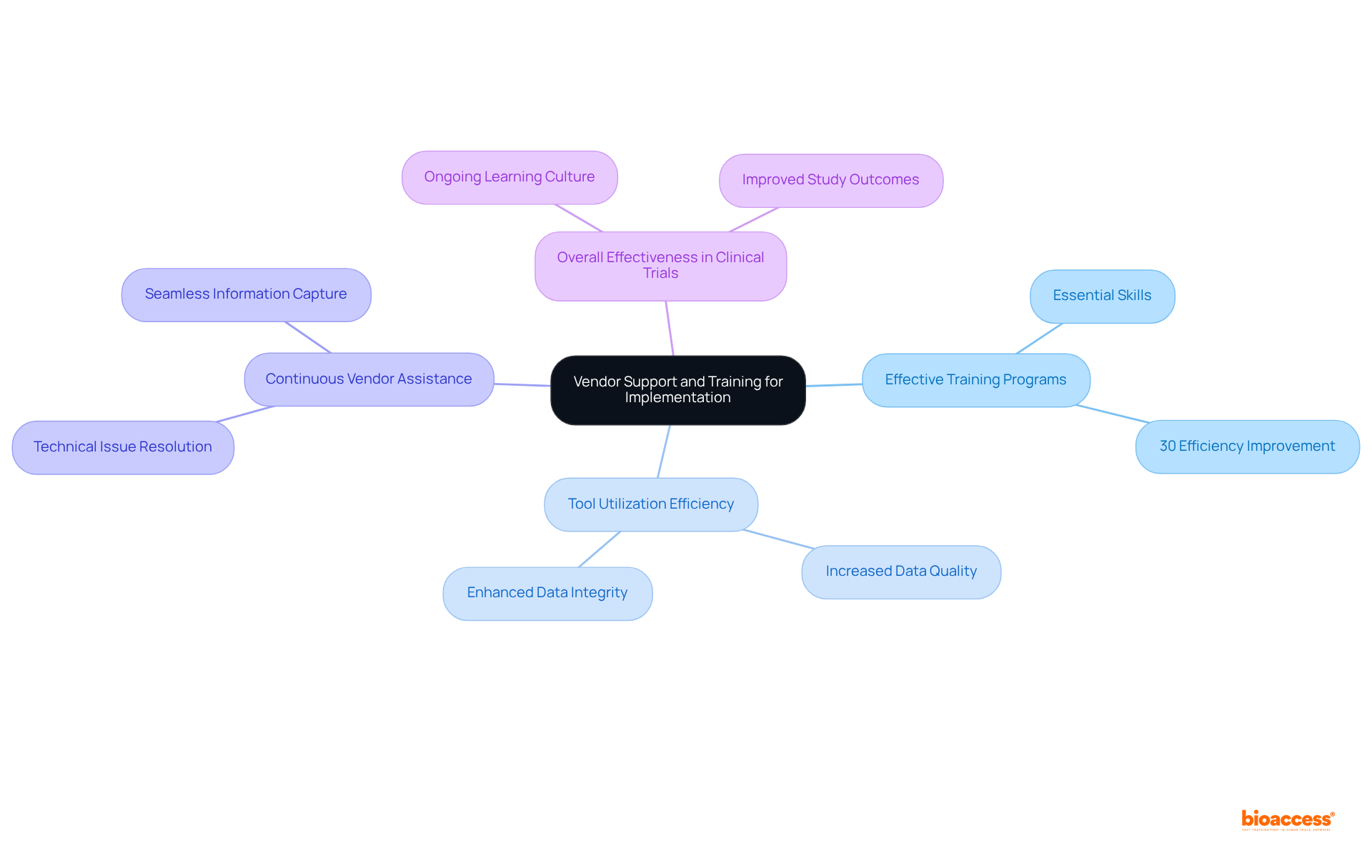
The pursuit of scalable solutions for a data capturer is essential for meeting the growing requirements of research studies. As experiments increase in scale and intricacy, the ability of a data capturer to expand information collection tools becomes crucial for managing elevated volumes while ensuring quality and efficiency. Scalable solutions not only enable the integration of new features and functionalities but also adapt to the evolving landscape of research in the health sector, benefiting data capturers.
This adaptability is vital, as studies often face challenges such as:
By leveraging advanced technologies, including AI, organizations can enhance their information management processes with a data capturer, ensuring timely and precise information gathering that supports the overall success of medical studies.
Furthermore, the transition to fully eSource-enabled studies is expected to improve interoperability and real-time monitoring, significantly reducing administrative burdens and accelerating study timelines by as much as six months. As researchers in the medical field navigate these complexities, the adoption of scalable data capturer solutions will be critical for achieving operational excellence and fostering innovation in the sector.
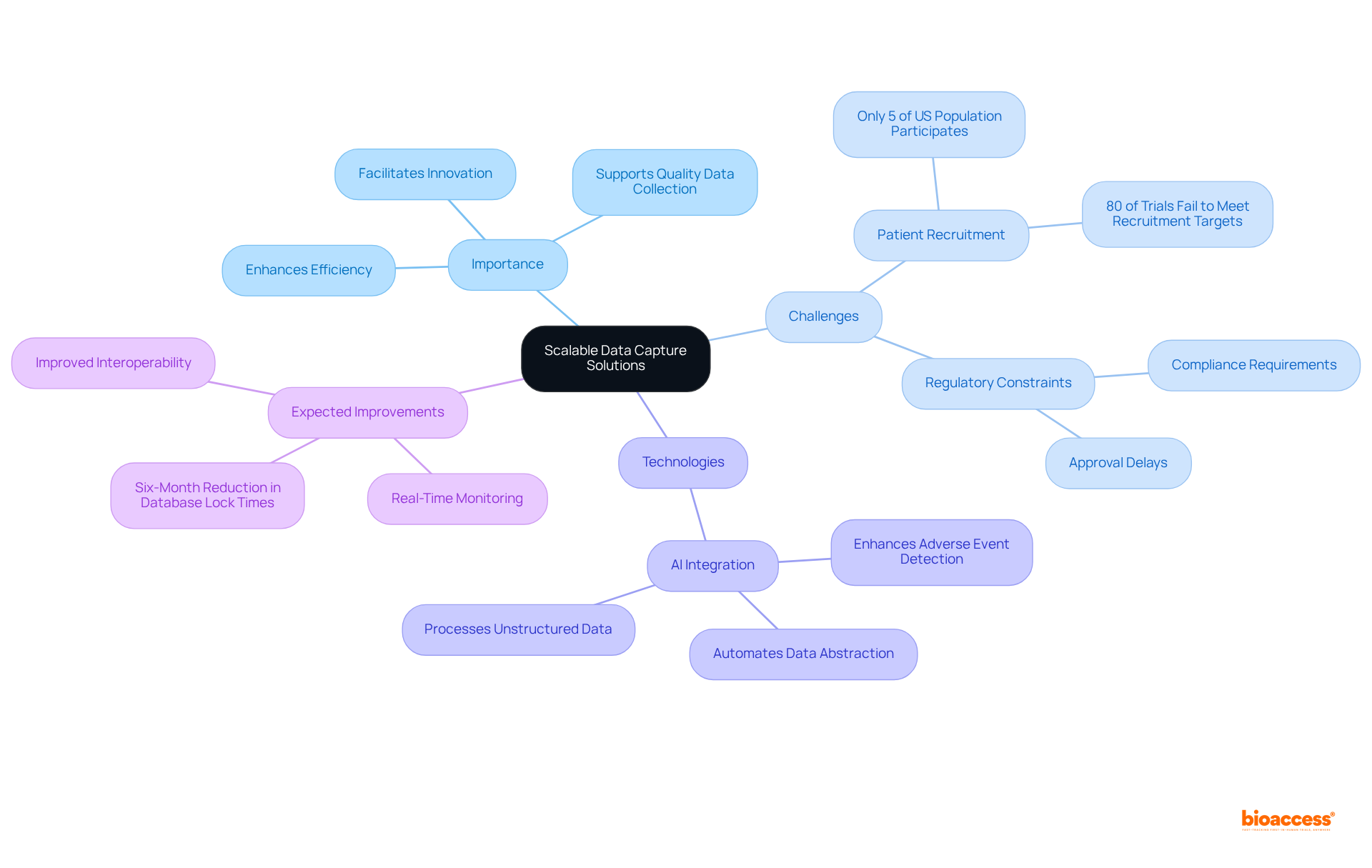
Assessing the cost-efficiency of information collection instruments is crucial for ensuring budget adherence in research studies. Organizations must evaluate not only the initial implementation costs but also the long-term savings that come from enhanced efficiency and minimized errors. By opting for cost-effective solutions, clinical trial teams can optimize their budgets while still ensuring that the data capturer provides high-quality data collection.
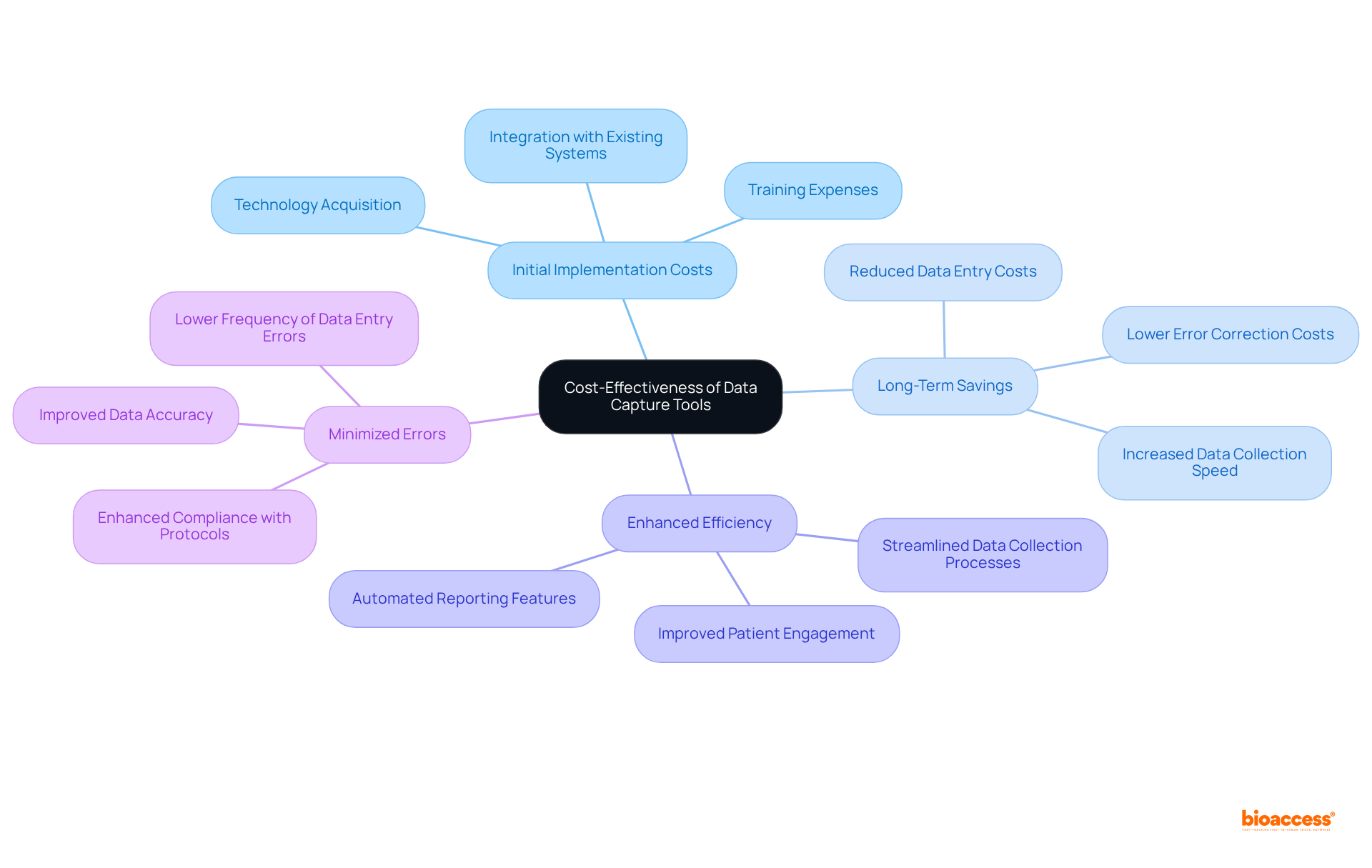
The significance of effective data capture in clinical trials cannot be overstated; it serves as the backbone for accurate research outcomes and timely decision-making. This article highlights essential features that enhance the efficiency and reliability of data collection processes, particularly through advanced electronic data capture (EDC) systems. By integrating these systems into clinical workflows, organizations ensure compliance with regulatory standards while improving the overall quality of data collected.
Key insights discussed include:
These elements not only facilitate smoother operations but also bolster patient safety and engagement, ultimately leading to improved study results. Furthermore, the importance of real-time data analytics and vendor support underscores the need for ongoing adaptation in a rapidly evolving research landscape.
In light of these considerations, organizations must prioritize the selection of data capture tools that align with their unique requirements and operational goals. Embracing these advancements will enhance the integrity of clinical trials and contribute to the broader mission of advancing medical research and improving patient care. The future of clinical trials hinges on the ability to leverage innovative data capture solutions that are efficient, secure, and tailored to meet the growing demands of the industry.
What services does bioaccess® provide to accelerate clinical trials?
bioaccess® specializes in data capture services that utilize advanced electronic information capture (EDC) systems to ensure accurate and efficient information collection, facilitating faster decision-making and enhancing operational workflows in clinical trials.
How do EDC systems benefit clinical trials?
EDC systems simplify information management, reduce human error through built-in validation checks, securely store data to minimize information loss, and help maintain the integrity of medical studies.
Why is quick access to information important in clinical trials?
Quick access to information is essential in dynamic environments like Medtech, Biopharma, and Radiopharma, as it can expedite regulatory approvals and improve market entry strategies.
What challenges do research professionals face with EDC systems?
Challenges include resistance to change among research professionals, highlighting the need for user-friendly designs and extensive training to facilitate the adoption of EDC systems.
What is the importance of integrating information collection tools with existing clinical workflows?
Integrating tools with existing healthcare processes enhances operational efficiency, reduces the learning curve for personnel, decreases entry mistakes, and improves the quality and reliability of data collected during research studies.
What best practices should be considered when selecting tools for EHR integration?
Best practices include assessing the compatibility of the tools with existing systems and determining whether EHR integration is essential or merely beneficial.
How do regulatory standards impact data capture in clinical trials?
Compliance with regulatory standards, such as FDA and ICH guidelines, is crucial for ensuring patient safety and credibility with regulatory bodies, facilitating smoother approval processes.
What features should information capture systems have to enhance compliance?
Essential features include robust audit trails, automated validation checks, and secure access controls to preserve integrity and ensure accountability in clinical trials.
What role does ongoing support play in maintaining EDC systems?
Ongoing support frameworks ensure that EDC systems remain effective and flexible as research needs evolve, which is vital for maintaining compliance with regulatory standards.
Why is it important to focus on regulatory adherence in information management as the medical research landscape evolves?
Emphasizing regulatory adherence is crucial for safeguarding patient safety and ensuring high-quality information generation, which is increasingly important as the landscape of medical research continues to change.